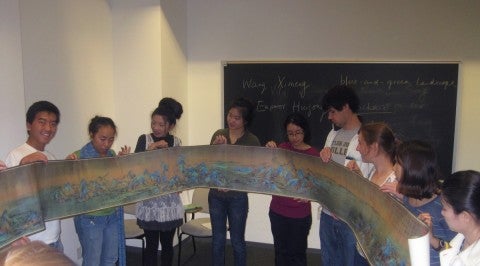"Prop Value"
This lecture will examine the question of the cinematic prop via the question of value, with particular regard to its proximity to and distance from Marxist categories of value (use, exchange). But the talk roams freely across a variety of registers and theoretical contexts in order to consider the way in which a focus on the prop—a non-human tool made for or appropriated by humans—reveals new ways of encountering cinema’s ontological instrumentality. (The talk extends from a book, "The Prop," that I have co-written with Elena Gorfinkel, forthcoming from Fordham University Press in 2025.)
====
John David Rhodes has published widely on European and American cinema and maintains a special interest in Italian cinema. He is interested in putting cinema into conversation with other artistic, cultural, and material forms. The relationship between the cinema and the built environment has been a consistent theme across his work. Most recently he has published "Spectacle of Property: The House in American Film." This book proposes a critique of private property and cinema spectatorship through a consideration of particular architectural styles of dwelling and their appearance in cinema. The book was hailed in Critical Inquiry for the way in which it ‘points cinema studies in new directions that should inspire scholarship, teaching, and debate about space, modernity, and Hollywood history’.
His first book, "Stupendous, Miserable City: Pasolini's Rome," interprets Pasolini's cinema and poetry as deeply felt political responses to Rome's enormous expansion in the postwar period. He also maintains an interest in avant garde cinema, one product of which is a recent book on Maya Deren's "Meshes of the Afternoon," for the BFI's Film Classics series. He has co-edited three volumes of essays: "On Michael Haneke" (with Brian Price); "Taking Place: Location and the Moving Image" (with Elena Gorfinkel); and "Antonioni: Centenary Essays" (with Laura Rascaroli). He is a founding co-editor of "World Picture," an online journal primarily dedicated to theoretical and philosophical approaches to media.
Materially underway are two further books: ‘Disembowelled Vision’, a book on Roman urban modernity and cinema, and ‘Belaboured’, a study of the relationship between style and labour, situated at the intersection of film history, aesthetic theory, and the critique of political economy. A third, more experimental project, ‘Notes for a Book on Pier Paolo Pasolini’, is also in the works.

